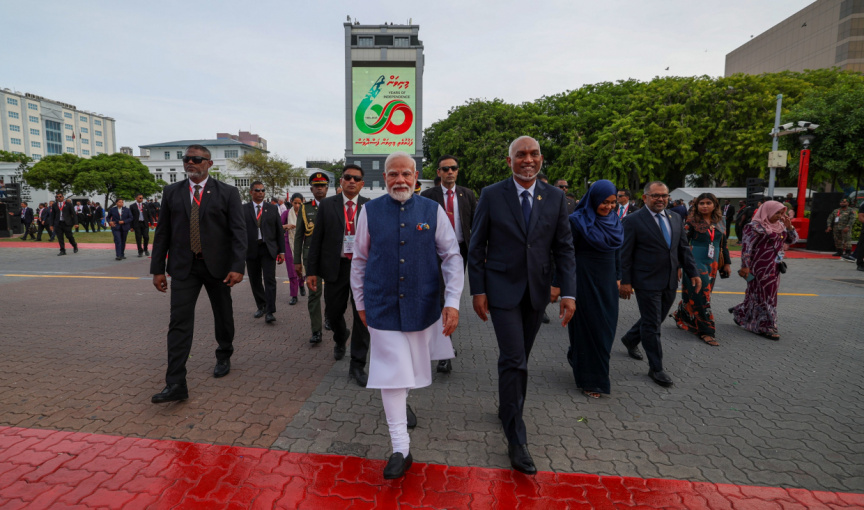
Indian Prime Minister Narendra Modi with Maldives President Dr Mohamed Muizzu at Republic Square, Male' on July26,2025. (X Photo/Narendra Modi)
The Maldivian Defense Ministry has cited confidentiality clauses and national security concerns in its refusal to disclose whether military agreements signed with India by the previous Maldivian Democratic Party (MDP) government have been extended.
This decision comes despite the current administration’s past pledges to reveal such agreements, which they had previously characterized as threats to national security and sovereignty.
President Dr. Mohamed Muizzu had previously placated that "worrying" provisions within these agreements had been altered. However, neither he nor his administration has provided specific details or publicly disclosed the agreements.
A local citizen, exercising their right under the Right to Information Act, formally requested the disclosure of these military agreements between India and Maldives, including their period of implementation, signing and expiry dates, and details concerning any extensions.

In its response, the Defense Ministry stated that the defense agreements between India and Maldives, active from 2018 to 2023 under the previous government, contained a "confidentiality clause" explicitly prohibiting their disclosure. The Ministry further asserted that transactions related to the renewal of defense agreements also constitute confidential information exchanged between the two nations, thus requiring the consent of both countries for public release.
The Ministry underscored that such information is directly linked to national security and, therefore, cannot be disclosed under the Right to Information Act. The specific provisions invoked for non-disclosure include:
The potential for the government to be charged with breach of confidentiality if the information is released.
The risk of adverse effects on Maldives' established relationships with other states or international organizations, or on agreements, negotiations, or document exchanges, if information obtained or known during such interactions is disclosed.
The right of the state agency to withhold information if its release poses a risk of irreparable harm within the scope of the Constitution that could endanger national security.
Despite President Muizzu's assertion that the agreements with India had been modified, Defense Minister Mohamed Ghassan Maumoon informed Parliament on May 6 that the amendment process was not yet complete. He stated that a "high-level coordination committee" was engaged in amending the agreements but that he was not a member of this committee.
The current government had previously alleged the deployment of thousands of armed Indian soldiers within the country and accused the Solih administration of entering into agreements with India that jeopardized national security. However, the government later clarified that only 74 Indian soldiers were present in Maldives. Subsequently, Defense Minister Ghassan himself confirmed that these personnel were unarmed.

Relations between the Maldivian government and India experienced a period of strain, exacerbated by the current administration's initial rhetoric concerning India. Nonetheless, President Muizzu has undertaken two visits to India in an effort to improve bilateral relations. Additionally, Indian Prime Minister Narendra Modi visited Maldives on July 26 to commemorate Maldives' Independence Day.